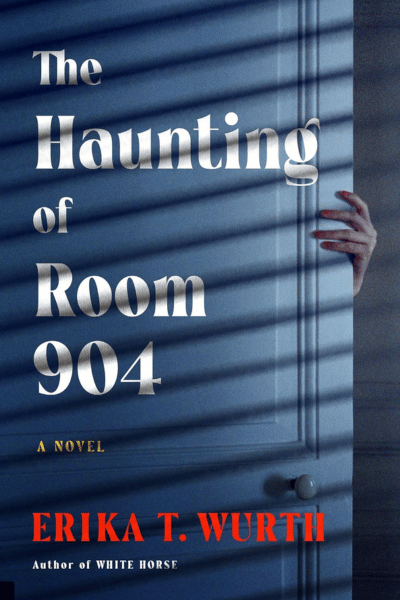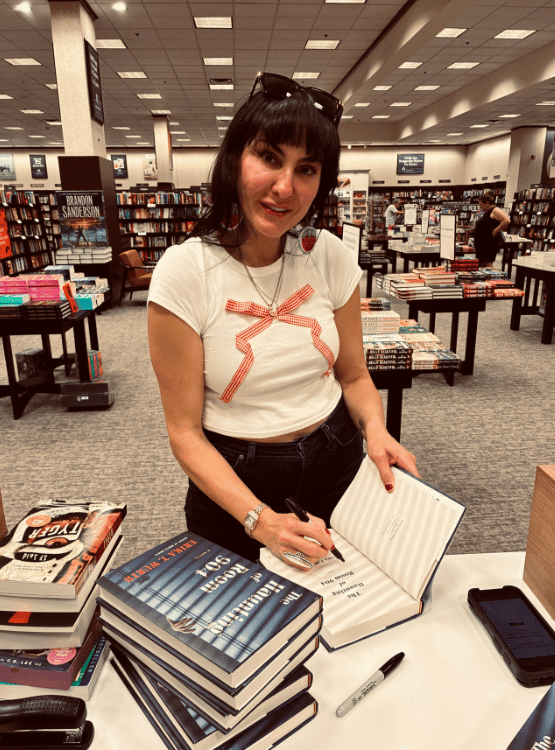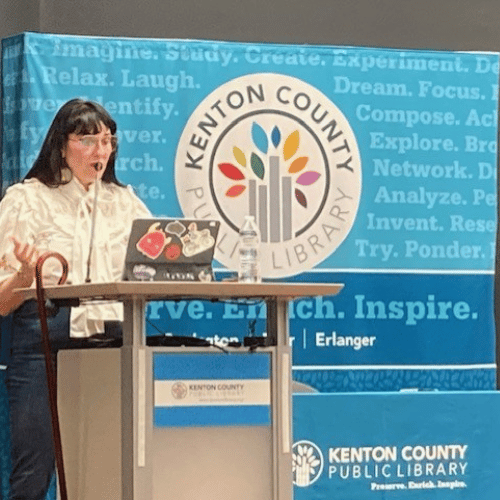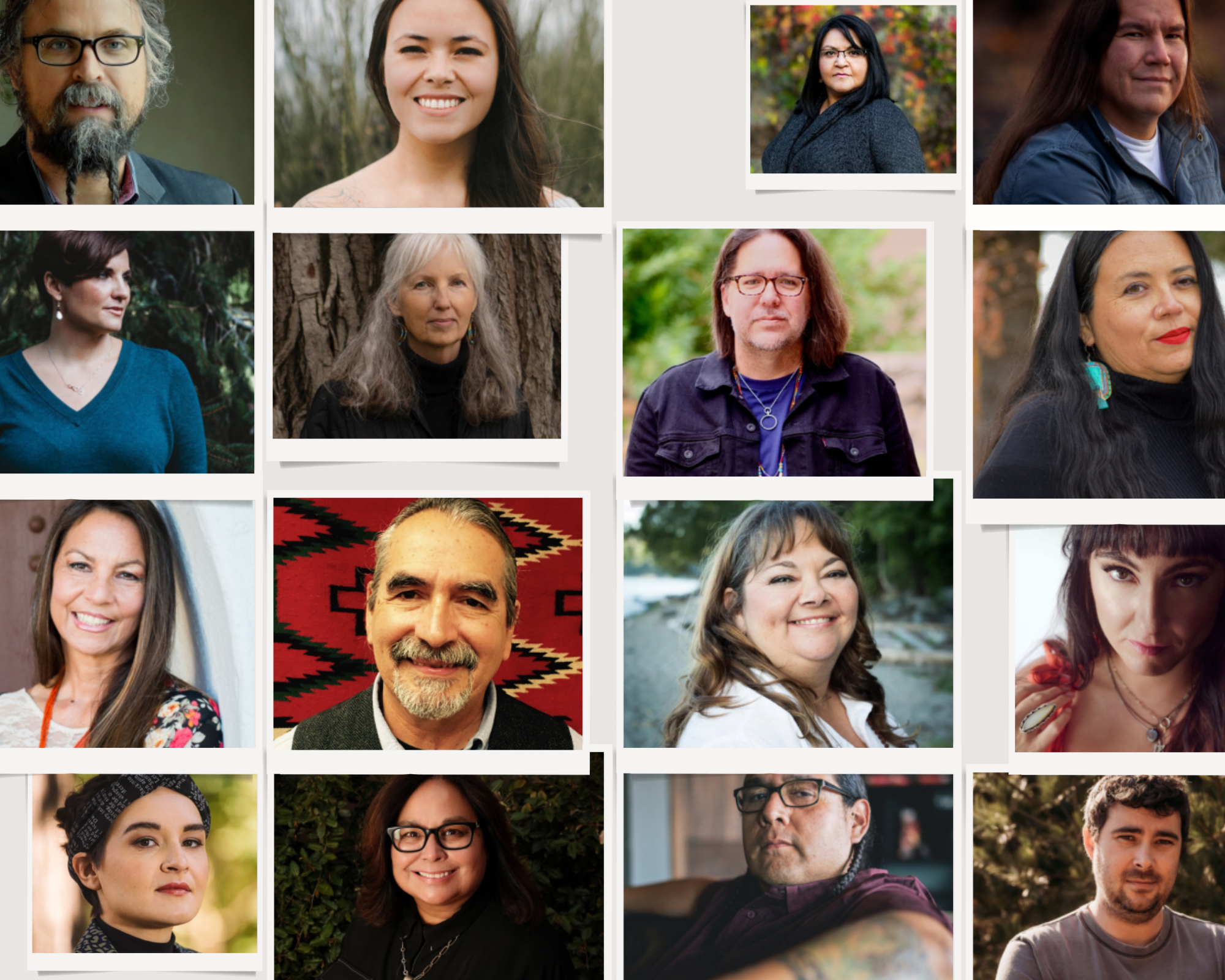 “The Q&A session with Erika was great. She had a lot of concrete advice advice for aspiring authors, which I think was really appreciated.” — Kenton County Public Library, 2025
“The Q&A session with Erika was great. She had a lot of concrete advice advice for aspiring authors, which I think was really appreciated.” — Kenton County Public Library, 2025
 “Erika was great to work with, she was very communicative and professional. She had great information and experiences to share with the attendees. Erika also shared some great information for writers. We truly enjoyed having her at the college.” — LCCC Foundation, 2024
“Erika was great to work with, she was very communicative and professional. She had great information and experiences to share with the attendees. Erika also shared some great information for writers. We truly enjoyed having her at the college.” — LCCC Foundation, 2024
 “Erika T. Wurth is an incredible guest-speaker. Gracious with her time, she is funny, knowledgeable, and able to address myriad kinds of readers. Our event included teens, the elderly, and all ages in between. I’ve rarely seen a more engaged audience.” — Westminster Public Library, 2024
“Erika T. Wurth is an incredible guest-speaker. Gracious with her time, she is funny, knowledgeable, and able to address myriad kinds of readers. Our event included teens, the elderly, and all ages in between. I’ve rarely seen a more engaged audience.” — Westminster Public Library, 2024
 “Twisty and electric. . . . Wurth handles the suspense with an expert hand. The novel unfolds in short, tense chapters that glide between past and present, and often torque into hair-raising turns.” — New York Times Book Review (Editor’s Choice)
“Twisty and electric. . . . Wurth handles the suspense with an expert hand. The novel unfolds in short, tense chapters that glide between past and present, and often torque into hair-raising turns.” — New York Times Book Review (Editor’s Choice)
 “An edgy delight. . . .Combines potboiler beats with an off-kilter, dreamlike atmosphere. . . . White Horsedistinguishes a gritty new punkish outsider voice in American horror.” — Esquire
“An edgy delight. . . .Combines potboiler beats with an off-kilter, dreamlike atmosphere. . . . White Horsedistinguishes a gritty new punkish outsider voice in American horror.” — Esquire
 “Excellent.” — Tommy Orange, on The Today Show
“Excellent.” — Tommy Orange, on The Today Show
 “Superb. . . . An easy, fast read that almost demands to be devoured in a single sitting. . . . [Wurth] has pushed against narratives that perpetuate Native American clichés, which makes this a must-read.” — NPR.org
“Superb. . . . An easy, fast read that almost demands to be devoured in a single sitting. . . . [Wurth] has pushed against narratives that perpetuate Native American clichés, which makes this a must-read.” — NPR.org
 “Crack open a cold one, pull on a well-worn band T-shirt and get ready for some spine tingles.” — Good Housekeeping
“Crack open a cold one, pull on a well-worn band T-shirt and get ready for some spine tingles.” — Good Housekeeping
 “Erika T. Wurth busts onto the writing scene like a wrecking ball. . . . Glorious. . . . Creepy.” — Colorado Sun
“Erika T. Wurth busts onto the writing scene like a wrecking ball. . . . Glorious. . . . Creepy.” — Colorado Sun
 “Propulsive. . . .Enthralling.” — BuzzFeed
“Propulsive. . . .Enthralling.” — BuzzFeed
 “A debut ghost story that will knock your socks off.” — Ms. Magazine
“A debut ghost story that will knock your socks off.” — Ms. Magazine
 “Stylish. . . . Old-school Stephen King fans, get on board.” — Philadelphia Inquirer
“Stylish. . . . Old-school Stephen King fans, get on board.” — Philadelphia Inquirer
 “Gritty, haunting, understated, and beautiful.” — CrimeReads
“Gritty, haunting, understated, and beautiful.” — CrimeReads
 “A gritty, vibrant debut.” — Nerd Daily
“A gritty, vibrant debut.” — Nerd Daily
 “An absolute stunner.” — Katy Hays, bestselling author of The Cloisters
“An absolute stunner.” — Katy Hays, bestselling author of The Cloisters
 “It’s metal to the end, it’s Denver to the core, it’s Native without trying–there’s blood, there’re roller coasters, and there’re about a thousand cigarettes smoked. What else can you ask for in a novel?” — Stephen Graham Jones, New York Times bestselling author of The Only Good Indians
“It’s metal to the end, it’s Denver to the core, it’s Native without trying–there’s blood, there’re roller coasters, and there’re about a thousand cigarettes smoked. What else can you ask for in a novel?” — Stephen Graham Jones, New York Times bestselling author of The Only Good Indians
 “Family ties are made from rusty barbed wire in White Horse, a book that feels as welcome as a dark bar on a hot afternoon, and whose story burns like a shot of rotgut whiskey.” — Grady Hendrix, bestselling author of The Final Girl Support Group
“Family ties are made from rusty barbed wire in White Horse, a book that feels as welcome as a dark bar on a hot afternoon, and whose story burns like a shot of rotgut whiskey.” — Grady Hendrix, bestselling author of The Final Girl Support Group
 “This ghost story is a perfect example of new wave horror that will also satisfy fans of classic Stephen King.” — Silvia Moreno-Garcia, author of The Daughter of Doctor Moreau and Mexican Gothic
“This ghost story is a perfect example of new wave horror that will also satisfy fans of classic Stephen King.” — Silvia Moreno-Garcia, author of The Daughter of Doctor Moreau and Mexican Gothic
 “An unapologetic world of dive bars, dark secrets, and true life horrors. I became completely enthralled. . . . Wurth [is] an exciting new voice in literary horror.” — Rebecca Roanhorse, New York Times bestselling author of Black Sun
“An unapologetic world of dive bars, dark secrets, and true life horrors. I became completely enthralled. . . . Wurth [is] an exciting new voice in literary horror.” — Rebecca Roanhorse, New York Times bestselling author of Black Sun


















